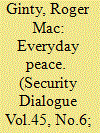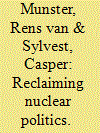|
|
|
Sort Order |
|
|
|
Items / Page
|
|
|
|
|
|
|
| Srl | Item |
| 1 |
ID:
136101


|
|
|
|
|
| Summary/Abstract |
This article argues that popular culture can make an important contribution to security studies, and especially critical security studies, either by offering alternative narratives that challenge the dominant view of security or by deconstructing the process of securitization. It then examines a genre of popular culture that until now has been largely ignored by security studies, noir police procedural novels, and shows how the contemporary police detective can no longer be viewed in the same way as the defender of the status quo depicted in the traditional police procedural. At the same time, he or she does not correspond to the portrait of the security professional, a member of those forces that contribute to the way security is officially defined. He or she has become, instead, a critic of prevailing security practices. To illustrate how this has happened, the article takes novels from two well-known authors of noir procedurals – Faceless Killers by Sweden’s Henning Mankell and Rounding the Mark by Italy’s Andrea Camilleri – and explores how their two very different police detectives, Kurt Wallander and Salvo Montalbano, treat the fears, anxieties and insecurities aroused by immigration in their respective societies and, in doing so, assume in their own way the role of critical security analyst.
|
|
|
|
|
|
|
|
|
|
|
|
|
|
|
|
| 2 |
ID:
136103


|
|
|
|
|
| Summary/Abstract |
This article is a conceptual scoping of the notion and practice of everyday peace, or the methods that individuals and groups use to navigate their way through life in deeply divided societies. It focuses on bottom-up peace and survival strategies. The article locates everyday peace in the wider study of peace and conflict, and constructs a typology of the different types of social practice that constitute everyday peace. While aware of the limitations of the concept and the practice, the article argues that everyday peace can be an important building block of peace formation, especially as formal approaches to peacebuilding and statebuilding are often deficient. An enhanced form of everyday peace (everyday diplomacy) has the potential to go beyond conflict-calming measures to encompass more positive actions linked with conflict transformation. The article can also be read as an exploration of ‘the local’ and ‘agency’ in deeply divided societies. It provides a counterweight to accounts of conflict-affected societies that concentrate on top-down actors, formal institutions and conflict resolution ‘professionals’. The apparent ‘banality’ of the everyday challenges us to think creatively about perspectives and methodologies that can capture it.
|
|
|
|
|
|
|
|
|
|
|
|
|
|
|
|
| 3 |
ID:
136105


|
|
|
|
|
| Summary/Abstract |
In January 2012, the US administration released new strategic guidance for the Department of Defense entitled ‘Sustaining US Global Leadership: Priorities for 21st Century Defense’. Two different security approaches seem to coincide in this document. By providing a governmental reading of the new strategic guidance, the aim of this article is to discuss if and how the guidance links a sovereign security understanding of great power politics on one side to governmental rationalities on the other. First, the guidance is discussed with regard to its main aims and strategies; then, second, the impact of governmentality in the guidance is revealed and systematized. Finally, the function that governmental logics have in the document, and the conceptual and political role that the minimally mediated encounter of sovereign (military) power politics with governmental rationalities plays, are considered.
|
|
|
|
|
|
|
|
|
|
|
|
|
|
|
|
| 4 |
ID:
136104


|
|
|
|
|
| Summary/Abstract |
Drawing on feminist research methodologies and theory, this article recentres critical security studies to focus on a migrant seeking an alternative form of security after his application for asylum was denied by the state. The two main objectives of this article are; first, to resituate a failed asylum seeker, Qasim, as an agent of international security as understood through his practice of seeking and obtaining security; and, second, to demonstrate a revised performative conceptualization of security through understanding the failed asylum seeker as practicing an embodied theorization of security. The encounter with Qasim shows alternative means of seeking security, which illustrates agency on the part of the migrant that exists actively outside of the state. This contests the positioning of migrants as passive victims and recognizes a way of being in the world that by necessity cannot rely on a state-based identity. Ethnographic methods, including participant observation and a narrative interview with Qasim, elucidate his practice of security and allow for the development of a theoretical conceptualization of security that remains true to a failed asylum seeker’s practice in the UK.
|
|
|
|
|
|
|
|
|
|
|
|
|
|
|
|
| 5 |
ID:
136102


|
|
|
|
|
| Summary/Abstract |
As nuclear weapons are again becoming the subject of critical scholarship and progressive activism, this article seeks to widen the perspective of critical security studies in relation to nuclear weapons and to provide a better understanding of the historical precursors of current ambitions. We do so by focusing on the central decade of the thermonuclear revolution (ca 1952–1963) and on a body of thought we term ‘nuclear realism’. Nuclear realists were united by the central conviction that liberal modernity could survive collective suicide only by radically rethinking and transforming its foundations. Günther Anders, John Herz, Lewis Mumford and Bertrand Russell take centre stage, and we highlight that the central pillars in their project of nuclear critique was a dissection of the legacy of the Enlightenment and an incisive examination of its implications for (international) politics in the nuclear age. These dimensions came together in their critique of the prevailing concept of deterrence. In an attempt to reclaim nuclear politics for a wider public, nuclear realists stressed the absolute centrality of imagination as a strategy for unmasking the power and rationality of a growing national security establishment, on the one hand, and bringing a distinct, alternative vision of global politics and security into view, on the other. This comprehensive yet multifaceted project, while afflicted by its own challenges, is deeply relevant for today’s nuclear politics.
|
|
|
|
|
|
|
|
|
|
|
|
|
|
|
|
|
|
|
|
|